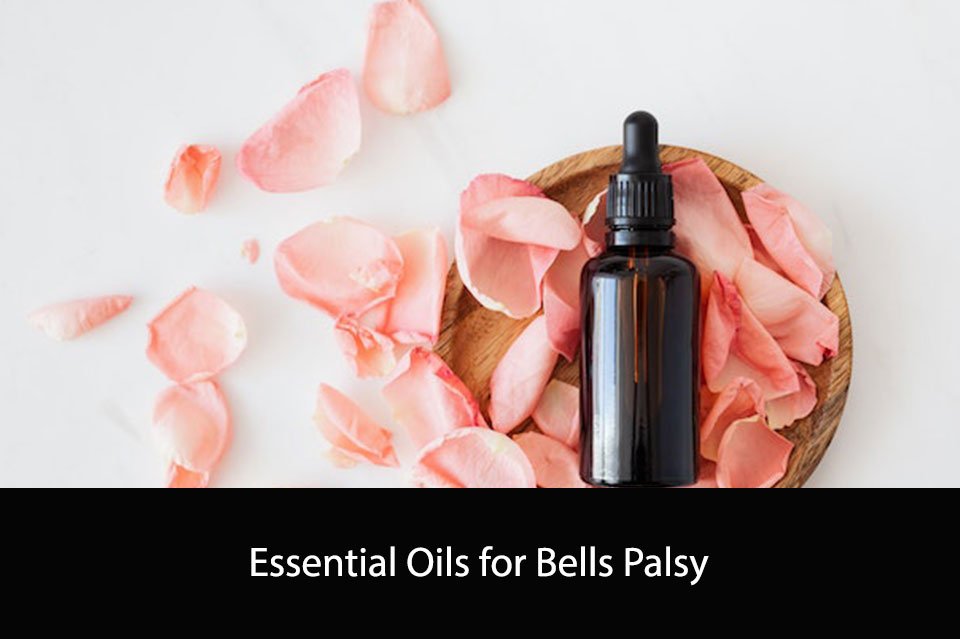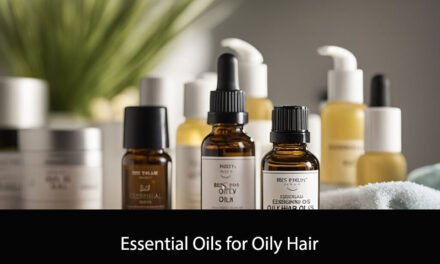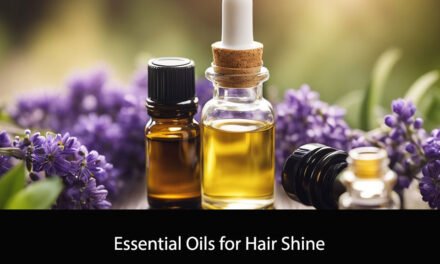Essential oils have been used for centuries for their therapeutic properties. They are extracted from plants and contain aromatic compounds that can help alleviate various health issues. One such condition is Bell’s Palsy, a condition that causes temporary facial paralysis. In this article, we will explore the use of essential oils for Bell’s Palsy and how they can help in the recovery process.
Bell’s Palsy can be a challenging condition to deal with, as it affects the facial nerves, causing facial drooping and weakness. While it usually resolves on its own within a few weeks, some people may experience long-term effects. Essential oils can be a natural and effective way to support the body’s healing process and alleviate symptoms. In this article, we will discuss the best essential oils for Bell’s Palsy and how to use them safely and effectively.

Understanding Bells Palsy
Bells Palsy is a condition that affects the facial muscles and nerves. It causes temporary weakness or paralysis of the muscles on one side of the face. This condition can occur at any age, but it most commonly affects people between the ages of 15 and 60 years old.
The exact cause of Bells Palsy is not known, but it is believed to be caused by a viral infection. The virus that causes the condition is thought to be the same virus that causes cold sores and genital herpes.
The symptoms of Bells Palsy can vary from person to person, but they usually include drooping of one side of the face, difficulty smiling or closing the eye on one side, and a loss of taste on the front two-thirds of the tongue. Some people may also experience pain or discomfort around the jaw or behind the ear on the affected side.
If you suspect that you may have Bells Palsy, it is important to seek medical attention as soon as possible. Your doctor can perform a physical examination and may order tests such as an MRI or CT scan to rule out other conditions.
While there is no cure for Bells Palsy, most people recover fully within three to six months. Treatment options may include medications such as corticosteroids to reduce inflammation, physical therapy to help strengthen the facial muscles, and surgery in rare cases.
In the next section, we will discuss how essential oils can be used as a natural remedy to help alleviate the symptoms of Bells Palsy.
Essential Oils: An Overview
Essential oils are highly concentrated plant extracts that are used for various purposes, including aromatherapy and alternative medicine. These oils are derived from different parts of plants, such as leaves, flowers, and roots, and are known for their therapeutic properties.
When it comes to Bell’s Palsy, essential oils have gained popularity for their potential benefits in managing symptoms associated with the condition. Some essential oils are believed to have anti-inflammatory and analgesic properties that may help reduce pain and swelling, which are common symptoms of Bell’s Palsy.
However, it’s important to note that essential oils should not be used as a substitute for medical treatment. While some oils may provide relief for certain symptoms, they should be used in conjunction with other treatments recommended by a healthcare professional.
Some of the essential oils that have been studied for their potential benefits in managing Bell’s Palsy symptoms include:
- Lavender oil: Known for its calming properties, lavender oil may help reduce stress and anxiety, which are common in people with Bell’s Palsy. It may also have anti-inflammatory and analgesic effects.
- Peppermint oil: Peppermint oil has a cooling and soothing effect that may help reduce pain and inflammation. It may also help improve blood circulation, which is important for people with Bell’s Palsy.
- Eucalyptus oil: Eucalyptus oil has anti-inflammatory and analgesic properties that may help reduce pain and swelling. It may also have a cooling effect that can provide relief for facial pain and discomfort.
Overall, essential oils may offer some benefits for managing Bell’s Palsy symptoms. However, more research is needed to fully understand their potential effects and safety. It’s important to consult with a healthcare professional before using essential oils for any medical condition.
Benefits of Essential Oils for Bells Palsy
Bells Palsy is a condition that affects the facial muscles, causing weakness or paralysis on one side of the face. Essential oils can be used as a complementary therapy to help manage symptoms and improve quality of life. Here are some benefits of essential oils for Bells Palsy:
Pain Relief
Essential oils such as lavender, peppermint, and eucalyptus have analgesic properties that can help reduce pain and discomfort associated with Bells Palsy. These oils can be applied topically to the affected area or used in a diffuser to inhale the aroma.
Stress Reduction
Bells Palsy can cause stress and anxiety due to the sudden onset of symptoms and the impact on facial appearance. Essential oils such as chamomile, bergamot, and frankincense have calming properties that can help reduce stress and promote relaxation. These oils can be used in a diffuser or diluted and applied topically to the skin.
Improved Blood Circulation
Essential oils such as ginger, rosemary, and black pepper have circulatory stimulant properties that can help improve blood flow and promote healing. These oils can be applied topically to the affected area or used in a massage oil to help improve circulation.
Overall, essential oils can be a helpful addition to a Bells Palsy treatment plan. However, it is important to consult with a healthcare professional before using essential oils, particularly if you are pregnant, breastfeeding, or have underlying health conditions.
Top Essential Oils for Bells Palsy
Lavender Oil
Lavender oil is one of the most versatile essential oils. It has a calming effect on the nervous system and is often used to reduce anxiety and stress. It also has anti-inflammatory and analgesic properties, which make it an excellent choice for managing pain and inflammation associated with Bells Palsy.
To use lavender oil for Bells Palsy, you can add a few drops to a carrier oil such as coconut or jojoba oil and massage the affected area. You can also add a few drops to a diffuser or inhale it directly from the bottle.
Peppermint Oil
Peppermint oil is another essential oil that can be beneficial for Bells Palsy. It has a cooling effect on the skin and can help to reduce inflammation and pain. It also has antispasmodic properties, which can be helpful for reducing muscle spasms and twitching.
To use peppermint oil for Bells Palsy, you can add a few drops to a carrier oil and massage the affected area. You can also add a few drops to a warm compress and apply it to the affected area.
Frankincense Oil
Frankincense oil is known for its anti-inflammatory and analgesic properties. It can help to reduce inflammation and pain associated with Bells Palsy. It also has a calming effect on the mind and can help to reduce stress and anxiety.
To use frankincense oil for Bells Palsy, you can add a few drops to a carrier oil and massage the affected area. You can also add a few drops to a diffuser or inhale it directly from the bottle.
Eucalyptus Oil
Eucalyptus oil has anti-inflammatory, analgesic, and antispasmodic properties, which make it an excellent choice for managing pain, inflammation, and muscle spasms associated with Bells Palsy. It also has a cooling effect on the skin, which can help to reduce inflammation.
To use eucalyptus oil for Bells Palsy, you can add a few drops to a carrier oil and massage the affected area. You can also add a few drops to a warm compress and apply it to the affected area.

How to Use Essential Oils for Bells Palsy
Topical Application
When using essential oils topically for Bells Palsy, it is important to dilute them properly in a carrier oil to avoid skin irritation. We recommend using a 2% dilution, which means adding 12 drops of essential oil to 1 ounce of carrier oil. Some carrier oils that work well for facial massage include jojoba oil, sweet almond oil, and coconut oil.
To apply the diluted essential oil blend, gently massage it into the affected area using circular motions. Focus on the cheek, jaw, and temple areas, as these are the most commonly affected by Bells Palsy. You can repeat this process up to three times per day.
Some essential oils that may be helpful for topical application include:
- Lavender oil: known for its calming and anti-inflammatory properties
- Peppermint oil: has a cooling effect and may help improve circulation
- Rosemary oil: has analgesic properties and may help reduce pain
Inhalation
Inhalation is another way to use essential oils for Bells Palsy. This method involves adding a few drops of essential oil to a diffuser or a bowl of hot water and inhaling the steam. It can help reduce inflammation and promote relaxation.
Some essential oils that may be helpful for inhalation include:
- Eucalyptus oil: has anti-inflammatory and decongestant properties
- Frankincense oil: known for its calming and grounding effects
- Tea tree oil: has antibacterial properties and may help prevent infection
It is important to note that essential oils should not be ingested and should be used with caution around children and pets. If you experience any adverse reactions, discontinue use immediately and consult with a healthcare professional.
Safety Measures and Precautions
When using essential oils for Bell’s palsy, it is essential to take certain safety measures and precautions to avoid any adverse reactions. Here are some important things to keep in mind:
- Always dilute essential oils before use. Essential oils are highly concentrated, and using them undiluted can cause skin irritation, burns, or other adverse reactions. We recommend diluting essential oils with a carrier oil such as coconut, jojoba, or almond oil before applying them to the skin.
- Perform a patch test before using any new essential oil. Apply a small amount of the diluted oil to a small area of skin and wait for 24 hours to see if any adverse reactions occur. If you experience any redness, itching, or swelling, do not use the oil.
- Avoid using essential oils near the eyes, nose, or mouth. Essential oils can cause irritation or burning if they come into contact with sensitive areas of the body.
- Do not ingest essential oils. Ingesting essential oils can be toxic and cause serious health problems.
- Keep essential oils out of reach of children and pets. Essential oils can be harmful if ingested or applied improperly.
- Consult with a healthcare professional before using essential oils if you are pregnant, nursing, or have a medical condition. Some essential oils can interact with medications or cause complications in certain medical conditions.
By following these safety measures and precautions, you can enjoy the benefits of essential oils for Bell’s palsy without any adverse reactions or complications.
Conclusion
In conclusion, essential oils may offer some relief for individuals with Bell’s Palsy. While there is limited scientific evidence to support their efficacy, many people have reported positive results from using essential oils as a complementary therapy.
It is important to note that essential oils should not be used as a substitute for medical treatment. If you are experiencing symptoms of Bell’s Palsy, it is essential to seek medical attention from a qualified healthcare professional.
When using essential oils, it is crucial to follow proper safety guidelines. Essential oils should never be ingested and should always be diluted before applying to the skin. It is also important to perform a patch test before using any essential oil to ensure that you are not allergic or sensitive to the oil.
Overall, essential oils can be a useful addition to a comprehensive treatment plan for Bell’s Palsy. However, it is essential to use them safely and in conjunction with medical treatment. As always, it is best to consult with a healthcare professional before beginning any new treatment regimen.

Frequently Asked Questions
What are some natural remedies for facial numbness?
There are several natural remedies for facial numbness, including essential oils, acupuncture, and massage therapy. These remedies can help to reduce inflammation, improve blood flow, and promote nerve regeneration.
What are the best essential oils for nerve regeneration?
Some of the best essential oils for nerve regeneration include frankincense, helichrysum, lavender, and peppermint. These oils can help to reduce inflammation, improve blood flow, and promote the growth of new nerve cells.
How can Dōterra essential oils help with nerve pain?
Dōterra essential oils can help with nerve pain by reducing inflammation, improving blood flow, and promoting the growth of new nerve cells. Some of the best oils for nerve pain include frankincense, helichrysum, lavender, and peppermint.
What are some Doterra oils that can help with trigeminal neuralgia?
Some of the best Doterra oils for trigeminal neuralgia include frankincense, helichrysum, lavender, and peppermint. These oils can help to reduce inflammation, improve blood flow, and promote nerve regeneration.
Can essential oils help with autonomic nervous system disorders?
Essential oils can help with autonomic nervous system disorders by reducing inflammation, improving blood flow, and promoting nerve regeneration. Some of the best oils for autonomic nervous system disorders include frankincense, helichrysum, lavender, and peppermint.
What is the role of vitamin deficiency in Bell’s palsy?
Vitamin deficiency can play a role in Bell’s palsy by weakening the immune system and making the body more susceptible to infections. Some of the most important vitamins for Bell’s palsy include vitamin B12, vitamin C, and vitamin E.





